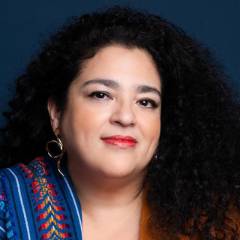Announcements
Rebecca Sharpless, professor of history, has been selected to be inducted into the Texas Institute of Letters. TIL is a distinguished honor society established in 1936 to celebrate Texas literature and recognize distinctive literary achievement. Sharpelss has written a variety of books on the topics of women in America and the South, Texas, food, sexuality and labor. Her most recent research explores how North Texans grew, milled, baked and ate wheat over time.
Sharpless will be recognized at the TIL’s 90th annual conference.
Learn more about TIL.
Hal Wright Professor of Economics John T. Harvey will present at Scotland’s Economics Festival in Leith from March 19 to 21. Harvey will participate in two sessions at the festival. His first session will focus on why alternative schools matter, what they reveal about the limitations of conventional economics and why many of their insights have been overlooked or sidelined. In his second session, he will speak on economic myths, austerity and “economists vs. comedians.” The festival will have sessions on a range of topics including the politics of austerity, community wealth, busting economic myths and the role of corporate power.
Learn more about Scotland’s Economics Festival.
Gavin P. Johnson, assistant professor of rhetoric and composition and director of composition, has received the 2026 Lavender Rhetorics Award for Excellence in Queer Scholarship from the Conference on College Composition and Communication, an association of the National Council of Teachers of English.
Johnson earned the Nontraditional Scholarly Text Award for “Cluster Conversation: Talking Back Through Rhetorical Surveillance Studies: Intersectional Feminist and Queer Approaches,” coauthored with Morgan C. Banville and published in Peitho. The award recognizes outstanding queer scholarship that advances composition and rhetoric through originality, research impact and contributions to teaching and theory.
The selection committee recognized the work for its timely examination of surveillance studies and its emphasis on amplifying marginalized voices.
Johnson will be recognized at the 2026 CCCC Annual Convention.
TCU Army ROTC’s Ranger Challenge team qualified for the international Sandhurst Military Skills Competition for the second consecutive year following a standout performance at the 5th ROTC Brigade Ranger Challenge Competition. The annual event features the top 12 ROTC teams from across a region spanning Arizona to Louisiana and Texas to Wyoming, with the top two teams advancing to compete at the United States Military Academy at West Point.
The competition tested cadets through a series of physically and mentally demanding events, including a 12-mile foot march carrying a 35-pound rucksack, construction of a one-rope bridge to retrieve equipment, building a bunker using 300 filled sandbags, a weighted physical fitness test, an Army Air Assault School-level obstacle course, a virtual rifle qualification course and technical tasks requiring the use of Army systems. Throughout the two-day competition, cadets traveled approximately 30 miles while carrying all required equipment and completed multiple cognitive challenges designed to test leadership, decision-making and problem-solving under stress.
The team’s continued success reflects the strength of TCU Army ROTC’s training and commitment to developing disciplined, resilient leaders prepared to excel in complex and demanding environments.
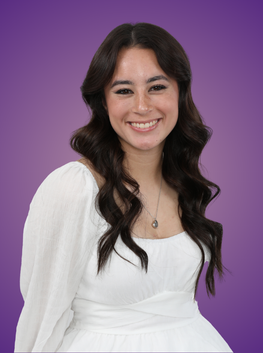
The AddRan College of Liberal Arts is excited to introduce you to Kaitlyn Oczkowski, the college's student intern.
Kaitlyn Oczkowski serves as a strategic content creator for the AddRan College of Liberal Arts. She is a first-year student majoring in creative writing and wants to be an author after graduation. As an AddRan student, she likes how each professor cares about their students’ success. Working as a student intern for the college, she hopes to make connections, learn how to better her marketing and communications skills and leave an impact.
If you see Kaitlyn around, be sure to say hi!
The AddRan Student Research and Creativity Symposium celebrates the scholarship and creative work of AddRan majors and minors. Students may present in one of three formats: Creative Writing (poetry or prose), Oral Presentation (10–15 minutes with Q&A) or a Poster Session. All presentations will take place in a supportive, professional conference-style environment
Presentations will be held Monday, April 13, in Scharbauer Hall. Proposals are due Tuesday, March 24, at 5:00 PM. For questions, contact Associate Dean Brad Lucas at b.e.lucas2@tcu.edu
Marcela Fuentes, associate professor of creative writing, has been awarded an American Book Award for her debut novel Malas. Presented by the Before Columbus Foundation, the award recognizes literary excellence and honors Fuentes’ powerful storytelling and years of dedication to her craft.
Malas is a richly layered, dual-timeline novel set on the Texas-Mexico border that follows two women, Pilar in the 1950s and her descendant Lulu decades later, as they contend with a family curse, cultural expectations, rebellion and legacy in a changing Tejano community.
Learn more about the American Book Awards.
The AddRan College of Liberal Arts is proud to announce the formation of the AddRan Research Council, an advisory body dedicated to fostering and advancing research and creative activity across the college.
The council recognizes faculty leadership in earning external funding awards for research and creative work. Its members will share their practical experience and insights as teacher-scholars to help strengthen AddRan’s research culture and complement the efforts of our graduate programs.
As TCU continues to expand its research and creative activity across disciplines, the AddRan Research Council will play an important role in shaping and supporting that growth within the liberal arts.
This summer, TCU Army ROTC cadets embodied the TCU value of excellence during Army ROTC Summer Training and Advanced Camp, held annually at Fort Knox, Kentucky. Their performance placed the program among the very best in the nation.
TCU cadets achieved an average score of 83.37 out of 105, far surpassing both the 5th Brigade average (71.77) and the national average (71.82). These results ranked TCU first in 5th Brigade (out of 38 schools) and fourth in the nation (out of 274 host programs).
Of the 18 cadets who attended, 15 scored above the national average, with several earning top national recognition:
- Cadet Ryan Sanders, Criminal Justice: third overall
- Cadet Patrick Sheats, Communication Studies, Honors College: 12th overall
- Cadet Edwin Rodriguez, Computer Science: Top 5%
- Cadet Rocco Ronzone, Finance, Honors College: Top 5%
- Cadet Logan Talabock, Political Science: Top 10%
- Cadet Matthew Lowe, Criminal Justice: Top 10%
- Cadet Riley Kozakar, Communication Studies: Top 15%
Cadets Sanders, Sheats, and Rodriguez also received the RECONDO award for excelling in every graded aspect of camp.
Beyond Advanced Camp, cadets pursued additional opportunities across the country and overseas, including Air Assault School, cyber and space training programs, leadership internships and international training. These experiences build on classroom learning while preparing cadets for leadership roles as Army Officers.
With record-setting results and diverse training accomplishments, TCU Army ROTC continues to stand out as one of the nation’s premier leadership programs, thanks to the cadre who dedicate the year to training and preparing cadets for success.
Two faculty members in TCU’s Department of English have recently published books that contribute important scholarship to the fields of higher education and reproductive justice.
Ariane Balizet, Ph.D., associate dean of faculty & engagement and professor of English, is co-editor of "Strategic Shakespeare: Transformative Leadership for the Future of Higher Education." The book highlights the leadership potential of humanities-trained scholars and reimagines how Shakespeare can support a more inclusive and sustainable future for higher education.
Stacie McCormick, Ph.D., associate professor of English and chair of the comparative race & ethnic studies and women & gender studies departments, is the author of "We Are Pregnant with Freedom: Black Feminist Storytelling for Reproductive Justice." This multidisciplinary work blends personal experience and advocacy to reimagine reproductive justice through the lens of Black feminist storytelling.
Riley Ford, history doctoral candidate, has been awarded the 2025 Robert L. and Robert C. Ruth Fellowship, which supports graduate students whose work may be supported by the U.S. Army Heritage and Education Center (USAHEC) collection. Her dissertation work bridges women's history, military history, gender history and the history of immigration.
The award allows Ford to engage in a concentrated three week summer research program with the Army Heritage Center Foundation (AHCF) at the USAHEC in Carlisle, Pennsylvania.
Learn more about the Ruth Fellowship.
The TCU AddRan College of Liberal Arts has been recognized by Academic Impressions as one of the Best Places to Grow for AddRan's New Faculty Mentoring Program (NFMP). The Best Places to Grow initiative showcases innovative and impactful higher education leadership and professional development programs. The NFMP was recognized as the 2025 Best New Faculty Mentorship Program. The program is designed to help new faculty integrate into the university community. The program provides a structured yet flexible approach to mentorship.
The NFMP pairs new faculty with small cohorts and an experienced faculty mentor. This model encourages regular discussions on key topics tailored to faculty needs in a collaborative, non-hierarchical environment. Over time, these mentoring groups evolve into dynamic professional networks, connecting faculty across disciplines. In addition to small-group mentorship, large-group sessions further enhance faculty engagement and build a sense of community.
Learn more about the Best Places to Grow initiative on the Academic Impressions website.
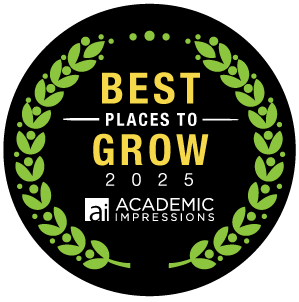
The AddRan College of Liberal Arts is pleased to announce Brad Lucas as the new Associate Dean of Research and Graduate Studies.
Dr. Brad Lucas is a Professor of Rhetoric and Composition in the TCU Department of English, where he has held leadership roles as department chair, director of undergraduate
studies and director of graduate studies. Joining the AddRan faculty in 2003, he co-founded
the Center for Digital Expression, served as editor of the peer reviewed journal Composition Studies, chaired the TCU Institutional Review Board for Human Subjects Research, and served
on 35 thesis and dissertation committees. His teaching focuses on technical communication,
ethics and research methodologies, and his scholarly activity focuses on political
rhetoric, university program dynamics and writing across disciplines. Committed to
graduate education and the full range of research and
creative activity, he advocates for cross-disciplinary innovation and engagement.
Thank you to Peter Worthing for his eight years of service in this leadership position and his continuous commitment to the AddRan College of Liberal Arts and TCU. During his time in the position, he developed the Student Undergraduate Research Fund (SURF), the AddRan Research Spotlight lunch series, dissertation writing groups, a faculty manuscript development program and has made countless contributions to the college and university. In recognition of his leadership, he was awarded the 2019 Michael R. Ferrari Award for Distinguished University Service and Leadership. He will return full time to the Department of History.
Lucas' appointment will begin on June 1st.
Being in Relation: Indigenous Peoples, the Land, and Texas Christian University, 1873-2023 tells the story of TCU’s relationships with the land and Native peoples since the university’s founding. Centering the perspectives of Indigenous people within TCU, the DFW community and beyond, the book presents an engaging combination of first-person narratives and academic essays that will teach well in the classroom. The book recounts the history of TCU’s acquisition of the lands it resides upon, presents insights on teaching with TCU’s land acknowledgment, provides eye-opening insights into Indigenous students’, faculty and staff experiences while at TCU, and offers advice to university leaders on how to further develop respectful and reciprocal relationships with Indigenous people and communities and to university faculty and staff on how to partner with Native community organizations to enhance pedagogy.
Published by TCU Press, the book was co-edited by Theresa Strouth Gaul, professor of English and director of the TCU Core Curriculum, Scott Langston retired instructor in religion and TCU’s inaugural Native American Nations and Communities Liaison and C. Annette Anderson, a member of TCU’s Native American Advisory Circle and a valued community mentor for TCU faculty and students. Contributors to the volume include AddRan College of the Liberal Arts alumni Albert Nungaray and Lauren Denham as well as an array of other TCU students, faculty, staff and alumni. Indigenous scholar and Fort Worth native Patrisia Gonzales wrote the foreword to the volume.
- Outstanding Poster Presentation: Ainsley Elliot, Geography
- Outstanding Research Presentation: Niteeka Narayan, English
- Outstanding Creative Writing Presentation: Lexie Woodall, English
- Outstanding Presentation in Anthropology: Paige Detzler, History and Anthropology
- Outstanding Presentation in Asian Studies: Riley Ford, History
- Outstanding Presentation in Human-Animal Relations: Maya Gasca, Biology/HARE
- Outstanding Presentation in Religion: Vittorio Piazza, Philosophy
- Outstanding Presentation in Spanish & Hispanic Studies: Sofia Nelson, English
- Mike Katovich Prize in Sociology: Kenny Lai, Biology; Ethan Reynolds, Sociology
Professor of English Mona Narain and Lorraine Sherley Professor of Literature Sarah Ruffing Robbins have been selected as featured speakers for the Historically Speaking: “The Feast of Genius and the Play of Art”: The Legacies and Communities of Phillis Wheatley Peters at the National Museum of African American History and Culture (NMAAHC). The event will take place online on Tuesday, April 8, and will spotlight the museum’s recently acquired collection of materials linked to poet Phillis Wheatley (Peters). Narain and Robbins will be joined by archivists, curators and program coordinators of NMAAHC.
For more information and registration for this free event, visit the NMAAHC website.
The LCpl. Benjamin W. Schmidt Symposium on War, Conflict, and Society has reached its initial endowment fundraising goal of $500,000. Thanks to the generosity of donors, this milestone ensures the symposium’s future as a leading forum for discussions on the lasting impacts of war.
Join the Department of History on April 3 for the 2025 Schmidt Symposium. This year’s keynote speaker is Robert K. Brigham, an internationally acclaimed historian of the Vietnam War. His insights will contribute to ongoing discussions about the intersection of war and society.
The event will be hosted in the Dee J. Kelly Alumni & Visitors Center. It is free and open to the public.
Visit the Schmidt Symposium webpage to learn about giving opportunities and the history of the symposium.
Jack Emery has been awarded one of five Nazi-era Provenance Research Grants from the Christie’s Foundation, a prestigious honor recognizing early-career scholars investigating the histories of artworks displaced during the Nazi era.
Emery’s research examines the work of Monuments, Fine Arts, and Archives (MFAA) officers in Asia at the end of World War II, exploring how restitution efforts in the region differed from those in Europe. His study aims to shed light on a lesser-known chapter of postwar cultural recovery.
Learn more about the Christie’s Grant for Nazi-era Provenance Research.
Associate Professor of Religion Patricia Duncan, Ph.D., has been awarded a prestigious pedagogy fellowship with the Yale Life Worth Living program.
This fellowship provides $15,000 in stipendiary support for the development of a new course at TCU that will explore fundamental questions of meaning and purpose in life through a commitment to "truth-seeking pluralism."
As part of the fellowship, Duncan will attend a retreat and participate in a series of workshops throughout the summer. These experiences will help shape a course that brings Yale’s innovative Life Worth Living model to TCU, fostering deep discussions about values, beliefs and purpose.
Learn more about the Yale Life Worth Living program.
Riley Ford has been awarded the 2025 Sharon Ritenour Stevens Prize. Her dissertation work bridges women's history, military history, gender history and the history of immigration.
The prize will assist her travel to the National Archives at College Park, Maryland, which holds military and civilian records essential for her work on the experiences of Japanese and Korean “war brides” as they undergo “Americanization” in the U.S.
Learn more about the Sharon Ritenour Stevens Prize.
U.S. News & World Report has ranked TCU no. 6 in the nation for 2025 Best Online Master's in Criminal Justice Programs. Since its creation in 2014, the online M.S. in Criminal Justice and Criminology Program has consistently been ranked among the nation’s best.
Associate Professor of Latin American History Alex Hidalgo, Ph.D., received the prestigious James Alexander Robertson Prize for the best article published in the "Hispanic American Historical Review" for his article "The Echo of Voices after the Fall of the Aztec Empire." The James Alexander Robertson Memorial Prize is awarded annually to the best article in the "Hispanic American Historical Review" (HAHR) in the previous calendar year.
Emeritus Professor of Rhetoric Richard Leo Enos, Ph.D., was among sixteen invited speakers from seven countries to present at the international Zoom conference, Ancient Greek Sophistry and Its Legacy, on December 12, 2024. Sponsored by the Canadian Society for the Study of Rhetoric, Professor Enos shared insights from his recent publication on Hellenistic rhetoric in the journal Humanities and discussed his ongoing research on archaeological sites in Greece and Türkiye.
The TCU Criminology & Criminal Justice Department received the 2024 J. Edgar Hoover Memorial Scholarship. The Former Special Agents of the FBI Foundation selects one criminology department annually to receive this scholarship. Brie Diamond, department chair, and student Kaedon Smith accepted the award on behalf of the department. The funds will be used to provide workshops for students interested in careers in law enforcement.
This election cycle, TCU is presenting a series of events titled Elections, Democracy and Social Values. The series aims to explore various viewpoints and aspects of an election and engage TCU’s diverse community in voting as informed, responsible citizens. The third event in the series, “Between ‘Not Perfect’ and ‘Excellent’: Evaluating American Elections with Jim Riddlesperger” will feature the professor of political science as he delves into decisions that have made fair elections difficult. Ahead of the event, Riddlesperger answered a few questions on the topic at hand for TCU News.
The city of Fort Worth recently announced that it would be the first major metropolitan city in the country to permit commercial drone deliveries. Walmart is the first to participate, offering delivery from select stores. Several TCU faculty, including Sean Crotty, associate professor of geography, and Weiwei Liu, associate professor of economics, offered their thoughts on the urban and environmental impact.
Fall 2024 officially brings with it an election season. This year, TCU is presenting a series of events titled Elections, Democracy and Social Values. The series aims to explore various viewpoints and aspects of an election and engage TCU’s diverse community in voting as informed, responsible citizens.
The first event, Betting on Democracy: Predictive Markets and Their Impact on Elections, will feature Grant Ferguson, instructor II of political science and director of public outreach. Ahead of the event, Ferguson answered a few questions on the topic at hand for TCU News.
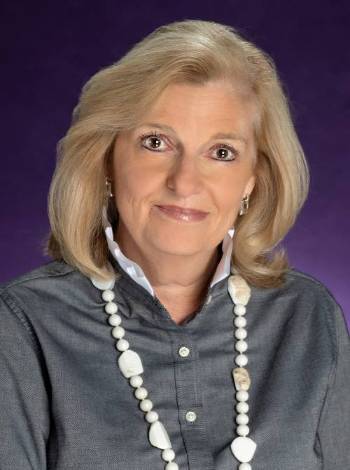 Susan Keating Smith is joining the AddRan College of Liberal Arts as the new Director
of Development.
Susan Keating Smith is joining the AddRan College of Liberal Arts as the new Director
of Development.
Susan is a proud third-generation Fort Worthian and sixth-generation Texan with 30 years of experience in fundraising and communications. She most recently served as Interim Director of Development at T3 Partnership and previously as Senior Director of Philanthropy for eight years at Planned Parenthood Greater Texas. She managed all significant gifts in Ft. Worth and oversaw events and three other cities in the affiliate. Susan also managed the community board of volunteers, grants, and foundations for Tarrant County. She is involved with the Women's Policy Forum and is the president of her community's HOA. (Susan may remind you to mow your lawn out of habit.) She has two children and one fantastic granddaughter, and she will be happy to tell you all about them if asked.
Welcome to TCU, Susan. Go Frogs!
Sharon Aronofsky Weltman, Ph.D., professor and chair of the Department of English, was awarded The David Paroissien Prize at the 2024 Dickens Society Symposium for her article "The Littleness of Little Dorrit," which was published in "The Review of English Studies," Volume 74, Issue 316. The prize is awarded each year to the best peer-reviewed essay on Dickens published in a journal or edited collection and is named for David Paroissien, a founding member of The Dickens Society.
The political science professor was named a Piper Professor of 2024 for the state of Texas by the Minnie Stevens Piper Foundation. He joins an elite group of only 14 TCU professors to receive this prestigious honor.
The 2024 LCpl. Benjamin W. Schmidt Symposium on War, Conflict and Society will feature leading historians, scholars and policy makers to discuss the legacies of the Korean War.
Far from a “forgotten war,” the Korean War inaugurated police action as a new kind of warfare, made the Cold War hot and began a series of “forever wars” that continue to shape international politics and diplomacy.
- Friday, March 22 — Dawn Alexandrea Berry, Ph.D., will deliver the keynote address about the efforts of the Defense POW/MIA Accounting Agency to find, identify and repatriate the remains of servicemembers killed in the Korean War.
- Saturday, March 23 — A panel will feature experts from across the social sciences and the policymaking world, who will discuss the causes, experiences and long-lasting consequences of a war that has yet to officially end.
Free and open to the public
Dee J. Kelly Alumni & Visitors Center / Cox
Register Here
Visit the Schmidt Symposium webpage to learn about giving opportunities and the history of the Symposium.
The State of the Economy Speaker Series will take place Wednesday, Jan. 31 at 11:30 a.m. in the Dee J. Kelly Alumni & Visitors Center. Presented by keynote speaker John Harvey, Ph.D., Hal Wright Professor of Economics at TCU, this year's topic is "Horned Frognostications: An Analysis of Current Economic Conditions and a Look Toward the Future."
While open to the public, a ticket or sponsorship is required to attend and can be purchased on the offical event webpage.
The event is made possible by the generous support of title sponsor Mitsubishi UFG Financial Group, Inc., and platinum sponsor Cadence Bank, Fort Worth Stockyards Branch.
Professor of Economics Stephen Quinn, Ph.D., has been selected to present as part of a panel at the Kaufman Policy Conference 2023 — Recent Turmoil in Banking Markets: Evidence, Causes, Regulatory Response, Lessons, and Future Needs. The session, “The Fed and Its Shadow: A Historical View,” will take place in Chicago on Wednesday, Nov. 29.
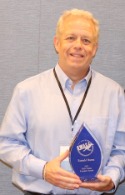 Ronald "Chip" Burns, PhD., professor of criminology & criminal justice, was awarded the Felix Fabian Founder's Award at the 2023 annual meeting of the Southwestern Association of Criminal Justice (SWACJ).
The award is given to SWACJ members who are deemed deserving of special recognition
for their outstanding contributions to the association and to the profession.
Ronald "Chip" Burns, PhD., professor of criminology & criminal justice, was awarded the Felix Fabian Founder's Award at the 2023 annual meeting of the Southwestern Association of Criminal Justice (SWACJ).
The award is given to SWACJ members who are deemed deserving of special recognition
for their outstanding contributions to the association and to the profession.
 A video discussing safe travel tips from criminology and criminal justice adjunct faculty member Tracy Walder was picked
up by multiple national and international media outlets including The Independent, HuffPost, New York Post and Daily Mail.
A video discussing safe travel tips from criminology and criminal justice adjunct faculty member Tracy Walder was picked
up by multiple national and international media outlets including The Independent, HuffPost, New York Post and Daily Mail.
In the video, the former FBI and CIA agent discusses which apps to use while you travel, which hotel floor to stay on, and items to bring to protect yourself and luggage.
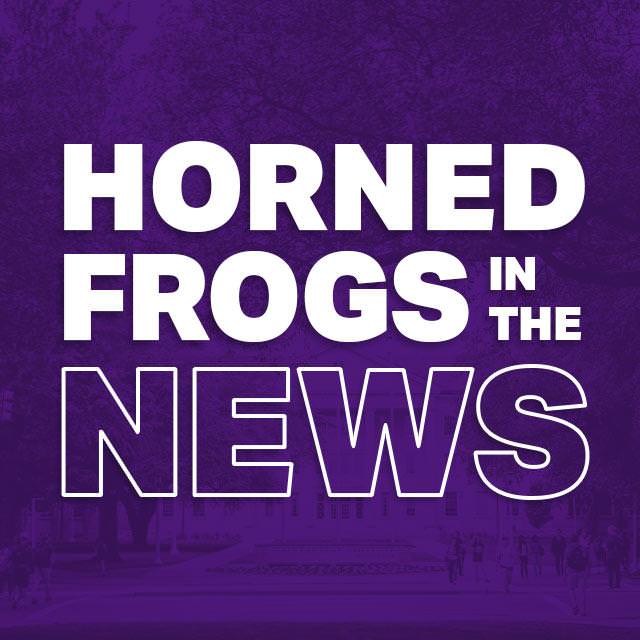

Dear AddRan Students, Faculty, and Staff,
Welcome back to campus for what I am sure will be a productive and exciting academic year!
I am excited to celebrate TCU’s and the AddRan College of Liberal Arts’ sesquicentennial. The theme for AddRan’s Sesquicentennial is AddRan is Everything. AddRan is the heart of Texas Christian University and touches on every aspect of the institution, the community, and the students. Whether a student majors in the liberal arts or takes courses in AddRan stemming from TCU’s core curriculum, liberal arts form the core of the student’s educational background and foundation.
In celebration of 150 years of humanities and social sciences at TCU, AddRan has a number of events to engage everyone. To kick off the celebration we will host an AddRan is Everything Welcome Back Celebration on September 6 featuring a t-shirt designed by AddRan alum Stephanie Treviño ’23 (Criminology & Criminal Justice), who was the first-place winner of the AddRan is Everything contest held in the spring. Please drop by to receive your complimentary shirt during the event! Limited quantities are available!
Thank you and Go Frogs!
Sonja Watson, Ph.D.
Dean, AddRan College of Liberal Arts
Upcoming Events:
- AddRan Welcome Back Party & Information Fair - September 6, 10 a.m. - 2 p.m., Frog Fountain
- AddRan Sesquicentennial Lecture Featuring Dana A. Williams - September 21, 12:30 p.m., Frog Fountain
- AddRan Family Weekend Open House - September 22, 2 - 4 p.m., Scharbauer Debate Chamber and Lobby
- AddRan Research Showcase - September 22, 1 - 3 p.m., BLUU Ballroom
- Triple D: Data Analytics, Digital Culture, Digital Technology Panel Discussion - September 27, 2 - 3:30 p.m., BLUU Beck & Geren
- Premier Green Chair: US Poet Laureate Ada Limón Keynote Lecture - November 15, 6 p.m., BLUU Ballroom
